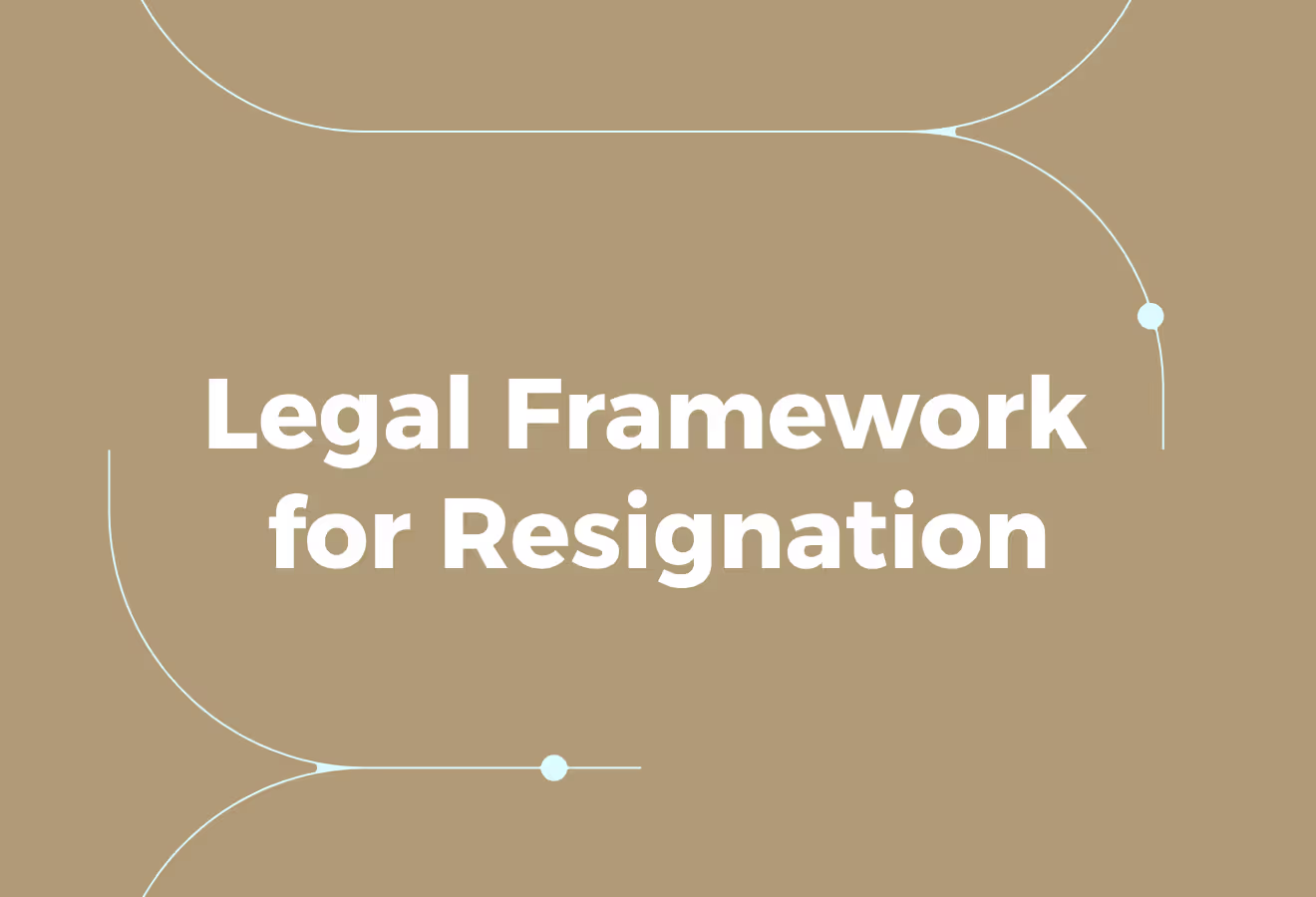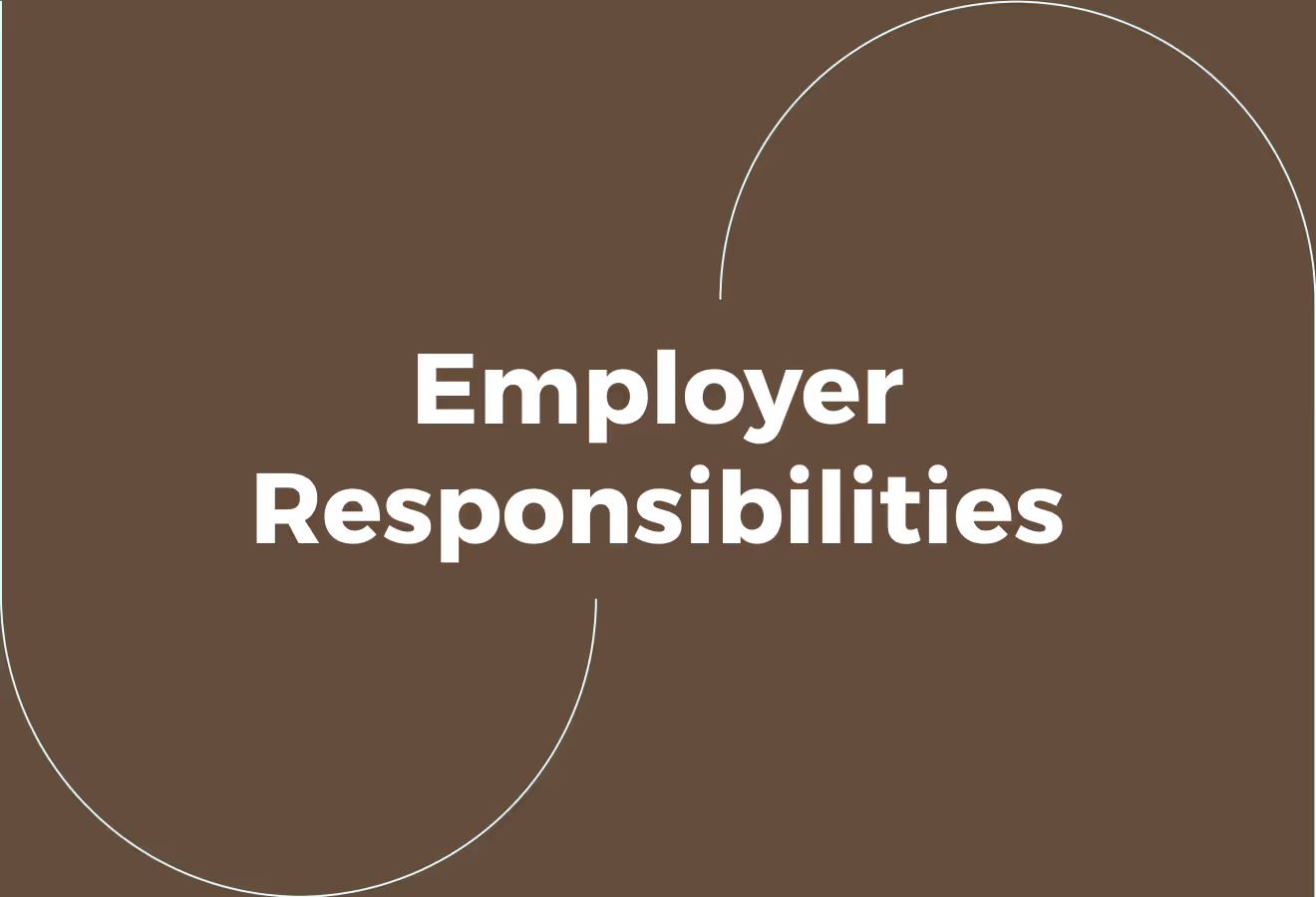An Employer's Guide for Managing MoHRE Limited Contract Resignations

Resigning from a limited contract with the Ministry of Human Resources and Emiratisation (MoHRE) can be more involved. Employees are no longer subject to automatic penalties for resigning early. However, if they resign without completing the notice period, they may be required to compensate the employer with pay equal to the unserved portion of notice.
In the UAE, these penalties are often set out in the offer letter or contract and can be substantial. The Ministry of Human Resources and Emiratisation (MoHRE) also regulates the resignation process for limited agreements. This means that, as an employer, you must follow specific procedures when an employee resigns from a limited contract. Failing to manage the resignation properly could lead to fines or other sanctions.
Understanding how to manage limited contract resignations can help make the process straightforward for both you and your employee. Cercli's global HR system provides the tools to manage such situations effectively. This blog post will outline how to manage resignations from limited contracts in the UAE.
What is a Limited Contract? And How Do They Work?

A limited contract, also known as a fixed-term employment contract, has a clearly defined duration. Under the UAE Labour Law, Federal Decree Law No. 33 of 2021, effective as of 2 February 2022, all private sector employment agreements must now be based on fixed-term contracts, often referred to as limited-term contracts.
A limited contract sets a specific duration for employment, which cannot exceed three years. It can be renewed or extended for the same period or a shorter duration, by agreement between the employer and employee.
Key Features of a Limited Contract
Defined Term
A limited contract clearly states a start and end date. This arrangement is often preferred when the role is linked to a specific project or timeframe.
Renewal by Implied Conduct
If both parties continue working after the contract’s expiry without signing a new agreement, the contract is considered renewed under the same terms, unless stated otherwise.
Impact on End-of-Service Benefits
The duration of any renewal or extension is taken into account when calculating the end-of-service gratuity. Therefore, if a contract is extended beyond the initial term, the whole period (original plus extension) is used in the final calculation.
Transition from Unlimited to Fixed-Term Contracts
The new law also required all unlimited contracts, previously valid under Federal Law No. 8 of 1980, to be converted to fixed-term agreements within one year of the law's implementation. This transition period may be extended if deemed necessary by the Cabinet.
Although the contract format has changed, employees on converted contracts remain entitled to the rights and protections outlined in the updated law.
Ensuring Compliance with Fixed-Term Contracts in the UAE
Fixed-term contracts have now become the standard employment arrangement in the UAE's private sector, aligning employment practices with more precise terms for both employers and employees. Businesses operating in the UAE are expected to ensure that their employment agreements comply with these provisions.
Understanding the Legal Framework for Resignation Under MoHRE Fixed-Term Contracts

Resigning under fixed-term contracts in the UAE is governed by Federal Decree Law No. 33 of 2021. The regulations are clear and allow for fair and balanced resignations that protect both employers and employees.
It is therefore crucial for both parties to understand the terms of resigning under fixed-term contracts, as well as how to navigate the process lawfully.
Standard Resignation Procedure for Fixed-Term Contracts
Under Article 43 of the Decree-Law, either party may terminate the employment contract, including fixed-term contracts, for a legitimate reason, provided that:
- Written notice is provided, and
- The notice period is between 30 and 90 days, as specified in the contract.
The following provisions also apply:
- The contract remains in effect during the notice period.
- The employee is entitled to full wages during this time.
- The employee must continue to work if requested by the employer.
- Both parties may agree to waive or shorten the notice period; however, the agreed-upon compensation for that period must still be paid.
- The notice period must be the same for both parties, unless a shorter notice period is mutually beneficial to the employee.
If one party fails to honour the notice period, they are legally obliged to pay compensation equivalent to the employee’s full wage for the period not worked.
Resigning Without Notice Under Fixed-Term Contracts
Article 45 outlines specific scenarios where an employee may resign immediately, without providing a notice period. These require formal procedures and notification to MoHRE.
These include:
Non-Compliance With Legal Or Contractual Obligations
The employee may leave without notice if the employer fails to meet obligations (such as salary payments or providing agreed benefits). The employee must notify MoHRE at least 14 working days in advance, and the employer must have failed to resolve the issue despite MoHRE's intervention.
Harassment Or Assault In The Workplace
If an employee experiences physical assault or harassment at work, they may resign immediately without serving notice. Employees must notify the relevant authorities and MoHRE within five working days of being able to do so in order to validate their resignation.
Unilateral Reassignment To Unrelated Duties
An employee can resign without notice if instructed to carry out duties that are fundamentally different from those agreed upon in the contract, without written consent, unless the work falls under temporary exceptions set out in Article 12 (such as urgent operational needs).
Serious Health Or Safety Risks
If the workplace presents grave dangers to the employee’s safety or health, and the employer fails to remove these risks despite being aware of them, the employee may be entitled to leave. The types of hazards are specified in Article 26 of Cabinet Resolution No. 1 of 2022.
Ensuring Regional HR Compliance and Operational Efficiency
Cercli is designed for companies in the Middle East that need a flexible, compliant, and reliable way to manage their workforce, whether teams are local, remote, or across multiple countries. Built for the realities of doing business in the region, Cercli helps companies in the UAE, Saudi Arabia, and across MENA simplify HR operations, stay compliant with local regulations, and run payroll with confidence.
From managing WPS (Wage Protection System) registrations in the UAE, processing GOSI in Saudi Arabia, handling DEWS contributions, and ensuring contracts and benefits are compliant, Cercli simplifies regional payroll and HR. As companies hire remote employees, contractors, and global teams, Cercli provides comprehensive support for global workforce management.
Managing the Full Employee Lifecycle with Cercli
Companies can pay contractors or full-time employees in over 150 countries through multicurrency payroll, Employer of Record (EOR) services, and compliant international contracts, all through a single platform.
Cercli gives HR teams a centralised system to manage every part of the employee lifecycle:
- Onboarding, asset management
- Leave tracking
- Time off calendars
- Payroll processing
- Offboarding
With one source of truth for all employee data, companies can eliminate manual processes, reduce payroll errors, and ensure complete visibility across the entire organisation.
Related Reading
Employer Responsibilities After Receiving Resignation

Acknowledge the Resignation in Writing
The first step an employer should take when an employee resigns under a fixed-term contract in the UAE is to formally acknowledge receipt of the resignation in writing. This written confirmation is important not only for record-keeping but also to establish clarity regarding the intended last working day based on the applicable notice period.
Verify Notice Period Compliance
Employers must ensure the employee’s resignation aligns with the contractual notice period, which must be:
- No less than 30 days.
- No more than 90 days.
Suppose the employee fails to work the whole notice period without a valid reason under Article 45 of the Labour Law. In that case, the employer is entitled to claim compensation equivalent to the unserved portion of the notice, calculated based on the employee’s last drawn wage.
Calculate and Settle End-of-Service Benefits
Once the notice period concludes, employers must: Calculate the end-of-service gratuity as per the employee’s final basic wage, by Article 51 of the Labour Law.
Include any outstanding payments such as:
- Unpaid salary
- Accrued but untaken leave
- Overtime (if applicable)
- Repatriation costs (by the contract)
If the contract is terminated before its expiry date without mutual agreement or for just cause, compensation may also be payable depending on the circumstances and the duration of work. In cases of termination by mutual agreement, expiry, or reasons not related to breach, Article 42 of the Labour Law applies..
Ensure Proper Documentation and Compliance
Employers must complete all required offboarding steps as outlined by MoHRE, including:
- Processing the Labour Card cancellation
- Cancelling the work permit and residency visa (where the employer acts as sponsor). Both the Labour Card and work permit cancellations must be completed through MoHRE channels, and final salary settlements must be processed before these steps can take place.
- Providing the employee with a service certificate upon request
- Retaining all documentation related to the resignation and final settlement for audit purposes
Maintaining accurate and complete records is essential to comply with regulatory requirements and to remain well-prepared in the event of a labour dispute or inspection.
Resignations under fixed-term contracts should be managed with clear adherence to legal obligations, fair practices, and proper documentation. Doing so upholds the employer’s standing with the MoHRE and contributes to the UAE's broader goal of promoting transparent and structured employment practices.
Legal and Financial Consequences for Employers

Mishandling Resignations Can Lead to Disputes and Penalties
Improperly managing an employee's resignation, such as failing to honour contractual notice, miscalculating end-of-service benefits, or neglecting to cancel permits appropriately, can expose employers to:
- Administrative fines
- Labour disputes filed via the Ministry of Human Resources and Emiratisation (MoHRE)
- Reputational harm within the labour system
Employers are expected to follow due process in all offboarding matters, with particular attention to notice periods, documentation, and payment of outstanding entitlements.
Unlawful Termination of Fixed-Term Contracts
Terminating an employee before the end of a fixed-term contract without a lawful reason can carry financial consequences for the employer.
Under Article 47 of the Labour Law, termination is considered unlawful if it is proven that the employee was dismissed for:
- Filing a complaint with MoHRE, or
- Initiating a lawsuit against the employer, provided the claim is found to be valid.
In such cases, the termination is classified as unlawful.
Complaints and Resolution Process
If an employee believes they were dismissed without just cause, they may complain with MoHRE. The Ministry will strive to reach a mutually agreed-upon resolution. Should this fail, the matter is escalated to the Labour Court.
If the court determines that the termination was indeed arbitrary, the employer can be ordered to pay financial compensation to the employee.
The amount is at the discretion of the court and is determined based on:
- The employee’s length of service
- The nature of the role
- The circumstances of dismissal
The Importance of Lawful Practice
For employers across the UAE, maintaining a compliant and structured approach to contract management, including resignation and termination procedures, is essential. Doing so not only aligns with the legal expectations of the MoHRE but also strengthens business continuity by fostering a fair and predictable employment environment.
Businesses should seek legal advice where required and establish proper internal HR protocols to mitigate risk and uphold their obligations under UAE law.
Related Reading
Book a Demo to speak with Our Team about Our Global HR System
Cercli is designed for companies in the Middle East to manage their workforce, whether local or located across more than 150 countries, through a single platform. Manage payroll compliantly across the UAE, Saudi Arabia, and the wider MENA region, handle leave, onboard employees, track assets, and process global contractor payments in multiple currencies efficiently.
Whether managing 25 employees or scaling to over 500 across multiple markets, Cercli combines local knowledge with international reach, providing your HR team with a compliant system to manage operations and pay your workforce globally. Book a demonstration to see how Cercli helps MENA companies simplify HR, payroll, and global team management, ensuring continuous compliance.
Related Reading










